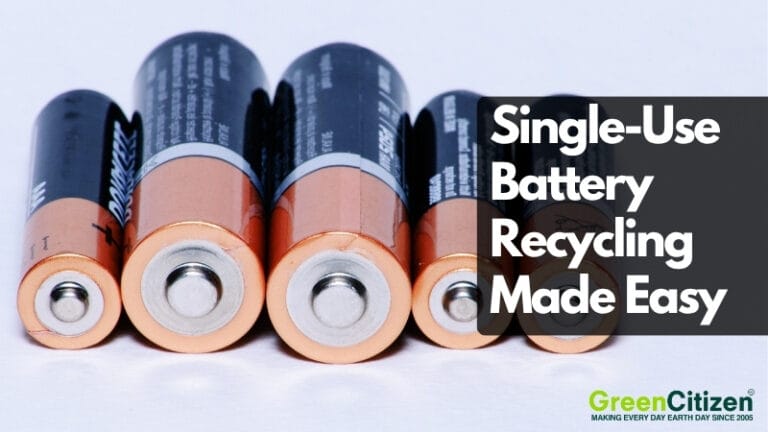Single-use battery recycling is one of the most overlooked steps in reducing household waste. According to the EPA, Americans throw away more than three billion batteries every year — nearly half of them are single-use alkaline batteries.
That’s a serious problem. Placed end to end, these batteries could circle the Earth six times.
Worse, they contain recyclable metals and harmful chemicals that don’t belong in landfills. When improperly disposed of, single-use batteries contribute to environmental pollution and waste valuable resources.
This guide will show you how to recycle single-use batteries properly, why it’s important, and where to take them. Whether it’s AA, AAA, or lithium button cells, responsible battery recycling helps reduce toxic waste and supports a more sustainable planet.
Key Takeaway: How to Recycle Single-Use Batteries
Single-use batteries are recyclable, but not through curbside programs. Use certified battery recycling services, local drop-off locations, or mail-in kits to ensure safe and responsible disposal. Recycling prevents pollution, recovers valuable metals, and keeps hazardous waste out of landfills.
Can You Recycle Single-Use Batteries?
Yes, single-use batteries are recyclable, but not through regular curbside recycling. These batteries require specialized handling because they contain recoverable metals like zinc and manganese. Some types, like lithium batteries, can also pose fire risks if damaged or improperly discarded.
To recycle them safely, you’ll need to use designated drop-off programs, mail-in recycling kits, or select retail locations. Companies like TerraCycle and Big Green Box offer these services, though availability may vary by location.
Recycling prevents batteries from leaking chemicals into soil and water, reduces fire hazards, and keeps valuable resources out of landfills.
In the next sections, we’ll show you exactly where to recycle single-use batteries and how to prepare them properly.
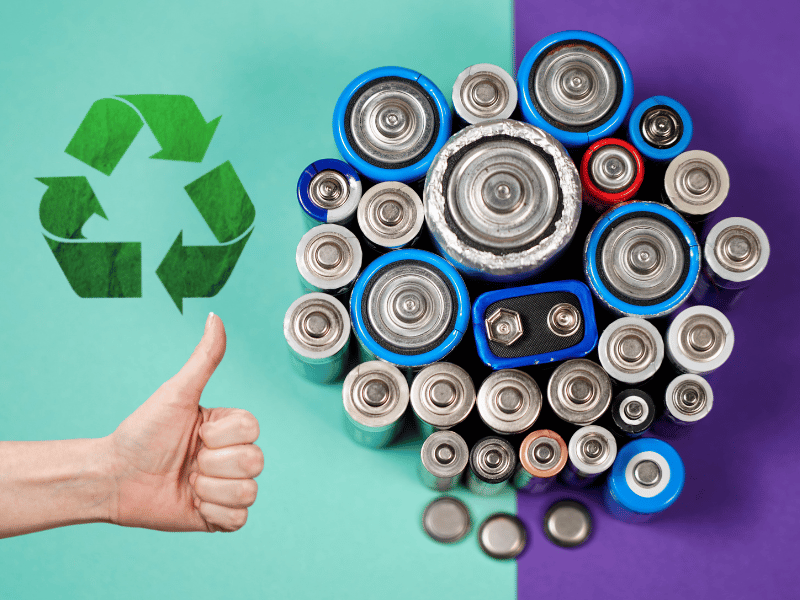
Single-Use Battery Sizes Explained (AA, AAA, 9V, and More)
Not all single-use batteries are created equal. Some are built to power clocks and remote controls for months on end, while others deliver quick bursts of energy to medical devices or security systems.
From the familiar AA to the tiny CR2032 coin cell, each battery size plays a distinct role — and comes with its own recycling considerations.
Knowing these differences isn’t just practical — it’s key to reducing waste, preventing pollution, and making sure recyclable materials don’t end up in landfills. In this section, we’ll break down the most common household battery sizes and highlight how each fits into responsible single-use battery recycling.
AA Batteries (1.5V)
AA batteries are the standard household choice, powering everything from clocks to toys. They balance moderate energy output with affordability and availability. While common, these batteries still require responsible disposal — recycling AA batteries helps recover metals and reduces landfill waste.
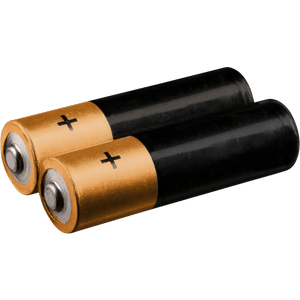
AAA Batteries (1.5V)
Smaller and lighter than AA, AAA batteries are found in low-drain devices like remote controls and thermometers. Their compact size means they store less energy but serve crucial roles in everyday electronics. These AAA batteries are recyclable, though often overlooked because of their size.
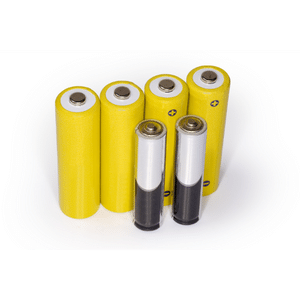
AAAA Batteries (1.5V)
While less common in homes, AAAA batteries are used in precision tools — styluses, glucose meters, LED penlights. Their slim form factor suits compact devices. Despite their size, proper recycling is still necessary as they contain recoverable metals and potential environmental hazards.

C and D Batteries (1.5V)
These larger cylindrical batteries deliver higher energy storage, perfect for devices like flashlights and appliances with small motors. Due to their bulk and capacity, they’re favored in high-drain or frequent-use items. Recycling these ensures the recovery of more substantial metal content compared to smaller batteries.
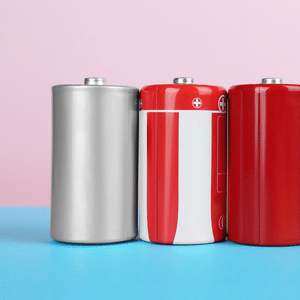
9V Batteries
Easily identified by their rectangular shape, 9V batteries power devices that demand higher voltage stability — smoke detectors, medical equipment, and alarms. Their design and chemical composition make proper recycling critical to prevent both environmental harm and potential fire risks.
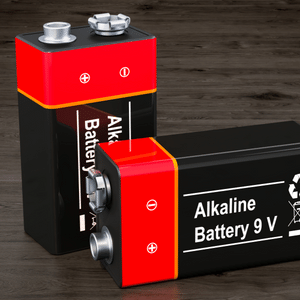
CR123A Batteries (3V)
These compact lithium batteries pack significant power, making them ideal for security cameras, tactical flashlights, and home automation devices. Known for their longevity and performance under stress, CR123A batteries require recycling as hazardous waste in many areas.
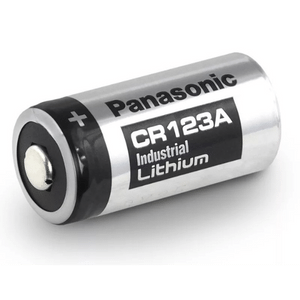
CR2032 Batteries (3V)
Often called coin cells or button batteries, CR2032s are found in watches, medical devices, and key fobs. They deliver reliable power in an ultra-slim package. Despite their size, these batteries pose environmental risks if trashed — proper recycling is necessary to avoid chemical leaching.
Common Types of Single-Use Batteries and Their Recycling Considerations
The chemistry inside a battery matters far more than its size. From alkaline to lithium to silver oxide, each battery type has unique performance traits, safety risks, and recycling requirements. Some can leak harmful chemicals. Others pose serious fire hazards if improperly discarded.
Knowing these differences helps ensure your single-use batteries are handled safely and responsibly — reducing waste, preventing pollution, and recovering valuable metals through proper recycling.
Alkaline Batteries
Alkaline batteries are the most widely used single-use household batteries. Common in everything from remote controls to clocks, they deliver moderate energy capacity (often over 2,500 mAh) and are available in standard sizes like AA, AAA, C, D, and 9V.
Though non-hazardous in most regions, they shouldn’t end up in landfills. Over time, alkaline batteries may leak and release chemicals into the environment. Recycling helps recover zinc, manganese, and steel while minimizing environmental risks.
Key Points:
- Found in most everyday devices
- Less hazardous than lithium but still recyclable
- Use certified single-use battery recycling programs
- Safer to dispose of than lithium batteries
- May sometimes leak and damage the device
Lithium Batteries (Primary Non-Rechargeable)
Lithium batteries offer the highest energy density of any single-use battery type. They can last up to four times longer than alkaline batteries and perform well in extreme temperatures, making them ideal for outdoor devices, security systems, and medical equipment.
However, lithium batteries are also highly flammable and require specialized handling. Improper disposal can lead to fires, even in landfills. Recycling lithium batteries is essential to prevent safety hazards and to recover valuable materials like lithium and cobalt.
Key Points:
- Long lifespan, excellent performance in harsh conditions
- Fire hazard if improperly disposed
- Recycle through hazardous waste programs or certified recyclers
- Won’t leak as alkaline batteries sometimes do
- Highly flammable and require specialized disposal
Carbon Zinc Batteries
Carbon zinc batteries are among the oldest battery technologies still in use. They’re extremely inexpensive and have low energy density compared to alkaline or lithium options. Many no-name or generic battery brands still produce them, but they’re gradually being phased out.
While cheap, carbon zinc batteries have short shelf lives and are prone to leaking. They contain fewer recoverable materials but should still be recycled properly to avoid environmental contamination.
Key Points:
- Low cost, low performance
- Increasingly obsolete
- Recycle where accepted alongside other household batteries
- Low cost
- Low shelf life
Silver Oxide Batteries
Silver oxide batteries are commonly found in small electronic devices like wristwatches, hearing aids, and medical equipment. These compact button cells offer exceptionally long life and stable voltage output. They also contain real silver, making recycling both environmentally and economically worthwhile.
Due to their precious metal content, silver oxide batteries are rarely disposed of as trash in responsible systems. Recycling helps recover valuable silver and prevents heavy metals from entering the environment.
Key Points:
- Used in watches, medical devices, calculators
- Contains recoverable silver
- Requires proper disposal through battery recycling services
- Extremely long life
- Expensive and used only for low-power applications
Zinc Air Batteries
Zinc air batteries generate electricity through exposure to oxygen, making them unsuitable for sealed devices but perfect for applications like hearing aids. They offer high energy density in a compact size and have largely replaced older mercury-based batteries in this category.
While less toxic than mercury batteries, zinc air cells are sensitive to humidity and temperature changes. Recycling is important to prevent unnecessary waste and to recover zinc.
Key Points:
- Common in hearing aids
- Environmentally safer than mercury cells
- Recycle with other button or specialty batteries
- They replace highly toxic mercury batteries
- Sensitive to humidity and extreme temperatures
Where to Recycle Single-Use Batteries?
Recycling single-use batteries isn’t always as straightforward as tossing them in a bin. Depending on the battery type and your location, recycling options can vary — from local household hazardous waste drop-offs to national mail-in battery recycling programs. Some services are free, while others require a small fee to cover shipping and processing.
In this section, we’ll explore both free and paid options for recycling household batteries — helping you choose the most convenient and environmentally responsible solution for your used batteries.
How to Recycle Single-Use Batteries for Free (Local Options)
Finding free ways to recycle single-use batteries often depends on where you live. Some communities make this easy with local drop-off programs, while others may offer limited options through periodic events.
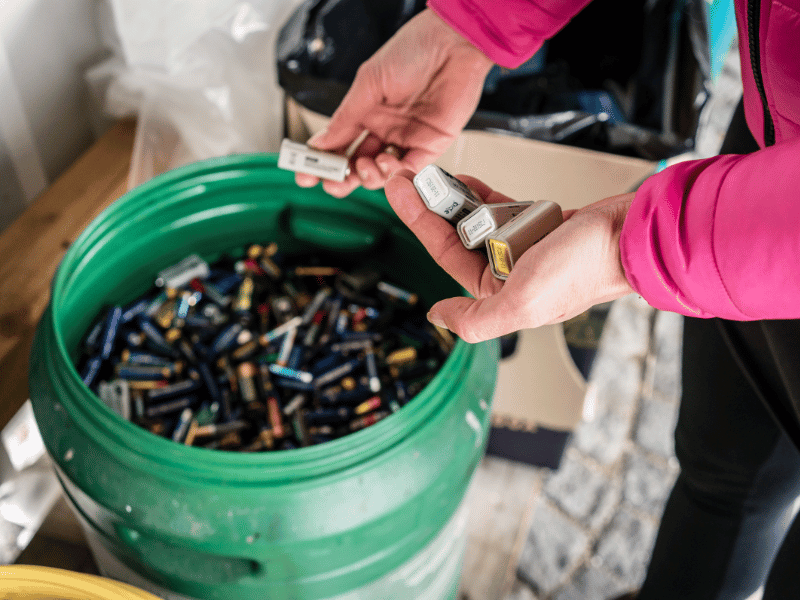
Here’s how to check your local recycling options for single-use batteries — without paying a fee:
- Municipal Programs: Start with your city or county’s waste management website. Many offer guidance on where to drop off batteries locally, often through household hazardous waste (HHW) collection events.
- Hardware Stores: Some hardware retailers collect household batteries for recycling at no cost, though participation varies by store and region. Always confirm with your local branch.
- Curbside Collection: In rare cases, curbside programs accept alkaline batteries. However, this depends entirely on local laws. → California prohibits landfill disposal of all batteries, while other states may only regulate rechargeable batteries.
Even if trashing alkaline batteries is legal where you live, it’s not ideal for the environment. Batteries contain metals like steel, zinc, and manganese — all recoverable through recycling. They also contain chemicals you wouldn’t want leaching into soil or water.
The EPA recommends recycling alkaline and carbon zinc batteries through certified programs whenever possible. Always verify the latest guidance through your city’s website or local waste hauler.
Paid Battery Recycling Programs for Single-Use Batteries
If local recycling isn’t available or you need a more convenient solution, several companies offer paid battery recycling programs for households and businesses. These services make it easy to dispose of single-use batteries responsibly, often providing prepaid shipping and recycling kits.
Retail Drop-Off Programs (Fees May Apply):
- Batteries Plus Bulbs: This retailer accepts standard alkaline batteries for recycling, typically charging a small fee. Fees and services vary by location, so check with your local store for details.
- Jewelry Stores, Car Dealerships, Audiologists: Some specialty retailers accept button cell batteries from watches, car fobs, and hearing aids. Availability varies, so contact local businesses directly.
Mail-In Battery Recycling Programs:
For households or businesses with larger quantities of used batteries, mail-in battery recycling kits offer a convenient, EPA-compliant solution.
Big Green Box:
Big Green Box provides a simple three-step program: purchase a container, fill it with used batteries, and ship it using prepaid labels. Prices start around $63 and include shipping and recycling costs.
Once full, drop it off at FedEx — Big Green Box ensures all contents are processed at EPA-certified recycling facilities.
Cirba Solutions:
Cirba Solutions offers free drop-off for standard household batteries (size D and smaller) at select locations. For larger volumes, they provide the iRecycle Kit — prepaid recycling containers in various sizes, with shipping and processing included.
TerraCycle:
TerraCycle’s Zero Waste Boxes offer battery-specific recycling solutions, such as the Alkaline Only Battery Bucket (up to 10 lbs capacity). Kits include terminal tape, prepaid return shipping, and certified recycling services.
Call2Recycle:
Call2Recycle offers flexible recycling options for both consumers and businesses.
- Consumers can use prepaid kits or drop off batteries at collection points.
- Businesses can calculate costs based on battery quantity and location using Call2Recycle’s online tools.
How to Find Local Recycling Centers for Single-Use Batteries
Although it’s legal in many areas to dispose of alkaline batteries in household trash, recycling remains the most environmentally responsible choice. However, finding local drop-off locations for single-use battery recycling isn’t always straightforward.
Many hardware stores and municipalities offer battery recycling options during household hazardous waste (HHW) collection days, but these services aren’t universal. Big box retailers often accept only rechargeable batteries, not single-use. Even when local options exist, details can be hard to find — outdated websites and incomplete directories make the search time-consuming.
That’s why GreenCitizen developed the Green Directory — a free tool that helps you quickly locate battery recycling drop-off sites near you.
How to Use the Green Directory:
- Enter what you need to recycle (e.g., “alkaline batteries”).
- Provide your zip code.
- Click “Search.”

The Green Directory will show you nearby locations that accept single-use household batteries — including hardware stores, public buildings with recycling stations, and specialized recycling centers.
👉 Visit Green Directory to find responsible recycling options in your area.
How to Safely Prepare Single-Use Batteries for Recycling
Whether you’re using a mail-in battery recycling kit or dropping batteries off locally, proper preparation ensures safe handling and prevents environmental risks.
For Mail-In Recycling Kits:
Reputable mail-in battery recycling services (like Big Green Box or TerraCycle) provide special kits with safety boxes, plastic bags, and instructions. These kits include everything needed to store batteries securely until shipping.
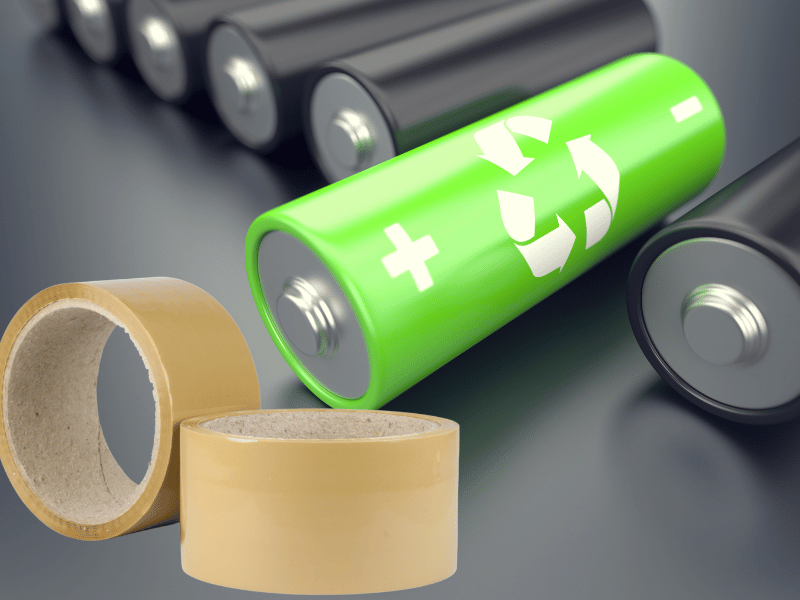
For Local Drop-Off Recycling:
If you’re taking batteries to a drop-off location, follow these best practices to prepare them safely:
1. Inspect and Handle Leaking Batteries Carefully:
- If a battery has leaked electrolyte fluid, it may not be accepted.
- Clean any residue from devices — leaking batteries can corrode electrical contacts.
- Confirm with your recycling center whether they accept damaged batteries.
2. Prevent Battery Terminals from Making Contact:
Improper storage can cause batteries to short-circuit, overheat, or spark — especially with lithium cells.
Recommended Methods:
- Tape over the positive (+) terminals with electrical or non-conductive tape.
- Bundle batteries together securely using tape to prevent shifting or terminal contact.
3. Store Batteries in Safe Conditions:
- Keep spent batteries in a cool, dry place.
- Avoid exposure to extreme heat or freezing temperatures to prevent damage.
4. Special Care for Lithium and Button-Cell Batteries:
- Place each lithium battery in a separate plastic bag OR tape over both terminals.
- Never dispose of lithium or button-cell batteries in household trash or curbside recycling. These can spark fires if mishandled.
Why Proper Preparation Matters for Single-Use Battery Recycling
Improperly stored batteries pose fire risks, chemical hazards, and environmental dangers. Safe handling protects waste workers and ensures batteries are recycled responsibly through certified programs.
Frequently Asked Questions (FAQ)
No, Home Depot does not recycle single-use batteries. You can’t mail single-use batteries to Home Depot or use their affiliate Call2Recycle bins at their Locations. Use the Green Directory to find the nearest recycler that accepts single-use batteries.
No, Best Buy does not recycle single-use batteries. They only accept and recycle rechargeable batteries. Use the Green Directory to find the nearest recycling service that accepts single-use batteries.
No, Staples does not recycle single-use batteries. They only accept rechargeable batteries. Ask in your local hardware store or use the Green Directory to find the nearest single-use battery recyclers.
Yes, lithium batteries can be recycled. Tape their terminal ends with electrical tape and place each one in a separate bag. Never dump them with household trash as they can cause fire when damaged. Use the Green Directory to find the nearest recyclers that accept lithium batteries.
Yes, electric car batteries are recyclable. When you buy a new battery, the store will often accept the old one and even cut you a discount. If you’re not buying the new car battery, they may even give you some cash for it. You should never put lead-acid car batteries in the trash or municipal recycling bin.
Single-use means non-rechargeable. It means you can only use them while their charge lasts. When they lose charge, you should mail them for recycling or take them to the nearest recycling center that accepts single-use batteries.
No modern battery is 100% recyclable. Depending on the type and chemistry, recyclers are able to recover a portion of the metals while the non-metallic remains are burned. Lithium-ion batteries have the highest recovery rate of almost 96%.
Yes, disposing of lithium batteries is bad for the environment because they contain toxic elements and can start landfill fires. Recycling lithium batteries is done less to retrieve valuable materials, than for environmental reasons.
Yes, it’s worth recycling lithium batteries. Lithium is a toxic metal that reacts violently when exposed to moisture and poses a threat to the environment. However, recycling lithium is an expensive and complicated procedure that can take 6 to 10 mines more energy than to mine and refine new lithium.
Final Thoughts on Recycling Single-Use Batteries
Single-use batteries remain one of the most common sources of household waste, yet millions still end up in landfills every year. Although many areas allow alkaline batteries in the trash, environmentally responsible disposal means recycling — not discarding. These batteries can take hundreds of years to break down, and they contain recoverable materials like zinc, manganese, and steel.
Proper single-use battery recycling prevents environmental harm, conserves resources, and keeps toxic materials out of our soil and water. Whether through local drop-off programs or mail-in recycling kits, there’s a responsible solution available.
Take the next step. Find your nearest battery recycling option and ensure your household batteries are recycled properly. Small actions lead to meaningful environmental impact.
